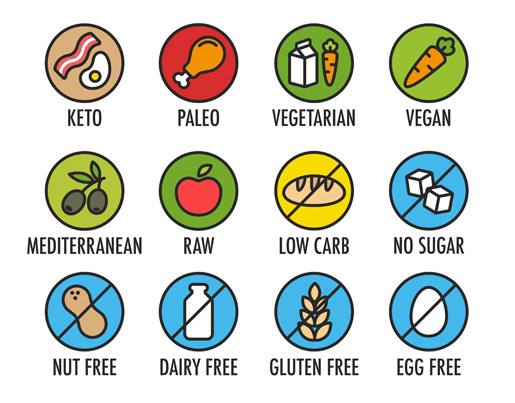 Elimination diets are also known as “free-from” diets and include some very popular types of eating plans, like paleo, gluten-free, sugar-free and dairy-free, just to name a few. Similarly, more people are becoming health-conscious about what they are fueling their bodies with and are deciding to eat organically and largely chemical-free, which spurs a diet that eliminates common chemicals and sweeteners in foods.
Elimination diets are also known as “free-from” diets and include some very popular types of eating plans, like paleo, gluten-free, sugar-free and dairy-free, just to name a few. Similarly, more people are becoming health-conscious about what they are fueling their bodies with and are deciding to eat organically and largely chemical-free, which spurs a diet that eliminates common chemicals and sweeteners in foods.
These types of diets may seem extreme to some people and a few are certainly under a lot of scrutiny by dietitians and authorities in the health and fitness community. If you are considering changing your diet to an elimination diet it is important to think about why you are doing it, if it’s safe and how to tell if you are getting results.
Types of Elimination Diets
An elimination diet can really be considered any diet in which you purposely exclude a certain food or an entire food group. The more common and successful elimination diets include:
- Paleo: Eliminates grains and legumes as well as any other non-whole food product. Some variations of paleo also exclude more food groups like dairy, particularly pasteurized dairy.
- Gluten-Free: Eliminates food containing gluten such as grains like wheat, barley, rye and triticale.
- Dairy-Free: Eliminates all dairy products like cheese, milk, creams, etc. Some people choose a pasteurized dairy-free diet only.
- Vegetarian: Eliminates all fish and meat. Is more so considered a lifestyle vs. a diet…but we’ve included it in this list since foods are eliminated.
- Red Meat-Free: Eliminates any type of red meat. Depending on diet variation, may allow lean meats or fish only.
- Processed Sugar/Artificial Sweetener-Free: Eliminates any type of artificial sweetener.
- Soy-Free: Eliminates all soy products from diet. Some variations will still allow fermented soy products like tofu.
- Alcohol-Free: Eliminates all alcoholic beverages from diet. Some variations may allow red wine.
Other elimination diets are extremely specific and small, such as removing nuts or shellfish from your diet and then trying them after a few weeks to see if you get a reaction.
Typically an elimination diet is used for a specific purpose, often to relieve some symptom rather than just to lose weight. Often these symptoms are a sign of a food allergy or food intolerance. This is where an elimination diet can really help you.
Elimination Diets and Allergies
Often times the little complaints we have after eating a meal are actually symptoms our body is expressing about an allergy or food intolerance. These symptoms can include something as small as a little heartburn to a full blown allergy reaction resulting in difficult breathing. If you suspect you may have a food allergy, you’re not alone. An average of 15 million Americans has some type of food allergy according to FARE.
Here are a couple common symptoms of a food allergy:
- Dizziness or feeling faint
- Facial and oral swelling
- Rashes and hives
- Odd tingling in mouth
- Itchiness in the throat
- Stomach cramps
- Constipation or diarrhea
- Nausea and/or vomiting
- Headaches
- Menstrual issues
- Anxiety and irritability
Some other symptoms of an adverse reaction to a food or food group can include lethargy, difficulty sleeping, unusual weight gain or weight loss, chronic pain and difficulty focusing on tasks. If you’ve been noticing problems with your health, it could very well be remedied by trying an elimination diet to see if you feel better.
Should You Try an Elimination Diet?
This question really is up to you and your doctor. Generally doctors agree that removing a type of food to see if you feel better is safe for most people. If you plan to exclude an entire food group, such as meat or grains, it is better to consult a doctor to monitor your health. It is also a good idea to get a blood test before changing your diet and then another after a month or two to see if there are improvements.
Eliminations diets are be a very helpful way to determine if a particular food or group of foods is causing health problems for you. Some people choose to go on an elimination diet for other health reasons and wind up surprised to notice symptoms they weren’t even previously aware of dissipated.

Ellen Hughes says
You got my attention when you said that an elimination diet can help people to go for organic and largely chemical-free food that can spurs a diet. My sister and I wanted to lose weight in the safest way possible. We don’t want to try diet programs that might not work for us, so we’ll be sure to get the help of a weight loss physician instead. I’ll still keep your tips in mind for future reference. Thanks!